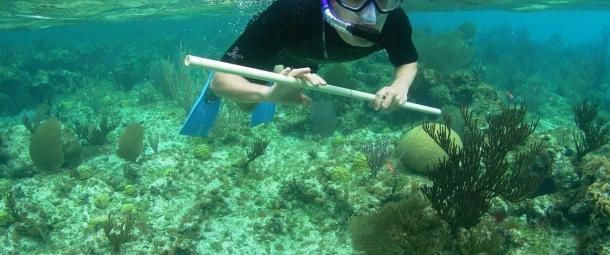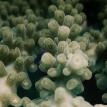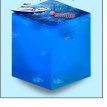
Coral Reef Research Programme
12 May 2014
The coral reef systems of the Republic of Maldives are the eighth largest in the World and cover an area of approximately 4513 km2. Due to the very low total area of land, coral reefs are the dominant ecosystem found in this chain of atoll islands. The rapid expansion of tourism since the 1970s has meant that dependence on coral reefs for income has grown. Coral reefs are fundamental to the economy of Maldives and people rely on the reefs both to bring in the tourists and to support the burgeoning reef fisheries, which have grown to supply the demand from the tourism sector. Tourism and fishing are the two major industries of the Maldives.
Because the islands of the Maldives are so low lying, climate change and associated sea-level rise, is a very real threat faced by the people of Maldives. In addition to their directly obvious economic significance, the coral reefs are also responsible for protecting these islands from the open sea and storms. Coral reefs themselves are also widely perceived to be very vulnerable to climate change, and evidence suggests they face rapid degradation because of this and other disturbances, such as fishing, boat and storm damage, increased pollution and direct damage such as land reclamation.
Coral reefs in the Maldives were severely affected by the 1998 El Nino event causing sever bleaching and mortality of more than 90% ofshalow waster coral communities.
In 1998, the coral reefs of the Maldives, as throughout the Indian Ocean suffered huge mortality as a consequence of coral bleaching caused by a sustained period of elevated sea surface temperatures. This scale of mortality as a result of coral bleaching was the first on record for the Indian Ocean, and many scientists predict bleaching at this scale and the subsequent mortality to increase in frequency as the effects of global warming continue. As a result of the 1998 bleaching event, a National Coral Reef Monitoring Program was initiated in order to monitor the recovery of the coral reefs and aid future coral reef management efforts through an increase in information on the distribution and diversity of corals in the Maldives. This was in partnership with the regional CORDIO (coral reef degradation in the Indian Ocean) programme, initiated in 1999 and funded by international donor agencies such as World Wildlife Fund (WWF) and the Swedish International Development Agency (SIDA). Consistent monitoring of the coral reefs was started in 1989 with support from the International Centre for Ocean Development (ICOD) although the scale and frequency has increased since 1998.
It is likely that reefs may be modified as a result of the bleaching even changing the community structure. Preliminary findings indicate that reefs are now becoming dominated by slow growing coral species.
Since then, the national coral reef monitoring program has covered 15 sites across the Northern, Central and Southern Maldives annually, with the long term objective being to investigate the reef recovery process in terms of the cover of coral and other benthic communities. The 15 sites were chosen because they had been surveyed prior to the bleaching of 1998 and so provided a baseline from which mortality and subsequent recovery could be tracked. All the sites are situated on the reefs within the atolls to ensure safe working conditions, protected from the surge caused by oceanic swell. From the data collected, it seems that the coral reefs are recovering at a faster rate than in many other areas in the Indian Ocean with overall mean coral cover increasing from 2% to 28% between 1998 and 2004, although this recovery was variable amongst the sites. Thanks to this systematic monitoring of Maldivian reefs, the impact from the 2005 tsunami was also recorded. Surprisingly, the impact to coral reefs was reported to be minimal, and the main priority now is to ensure the continued recovery of coral reef processes and that adequate, adaptive and eventually predictive mechanisms are in place to safeguard against future events and minimise the negative impacts. The continued monitoring process will ensure management decisions are based on informed advice.





